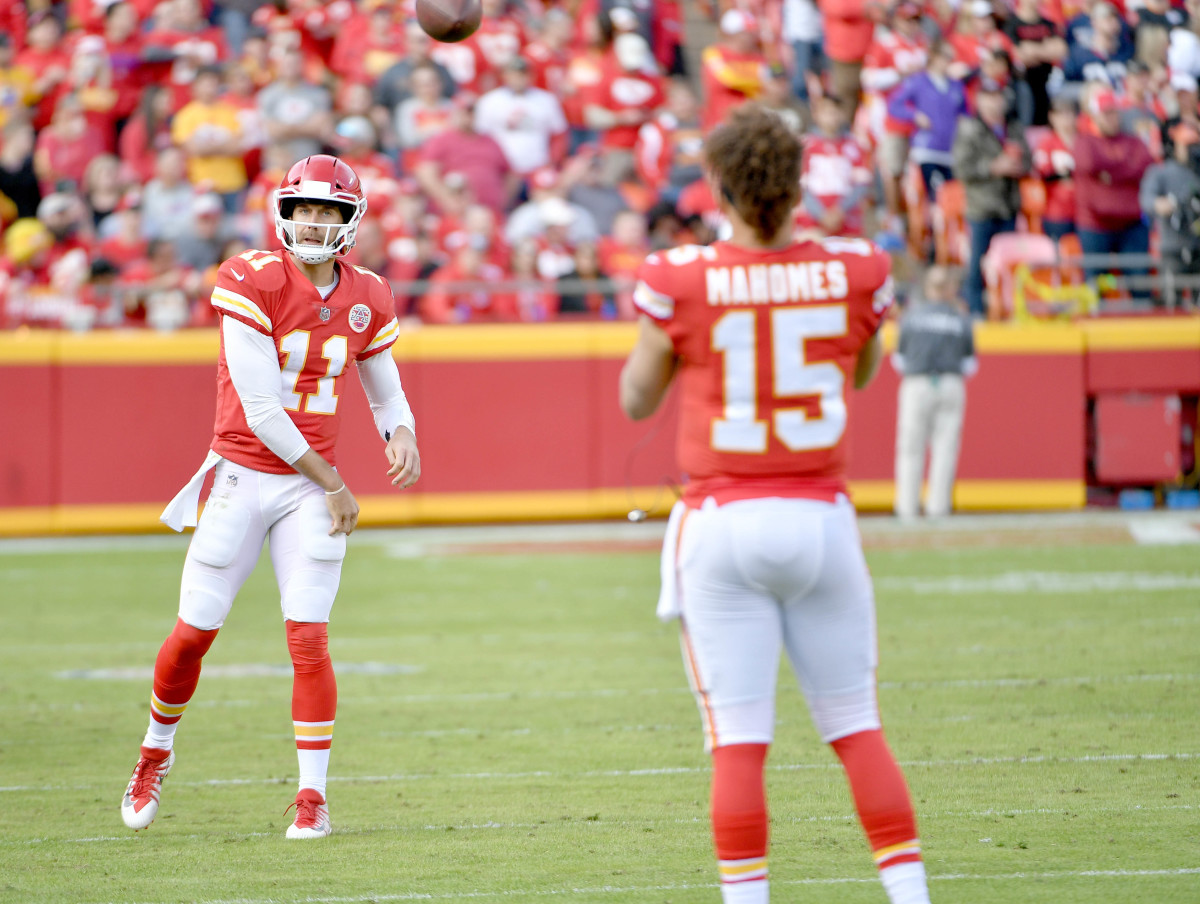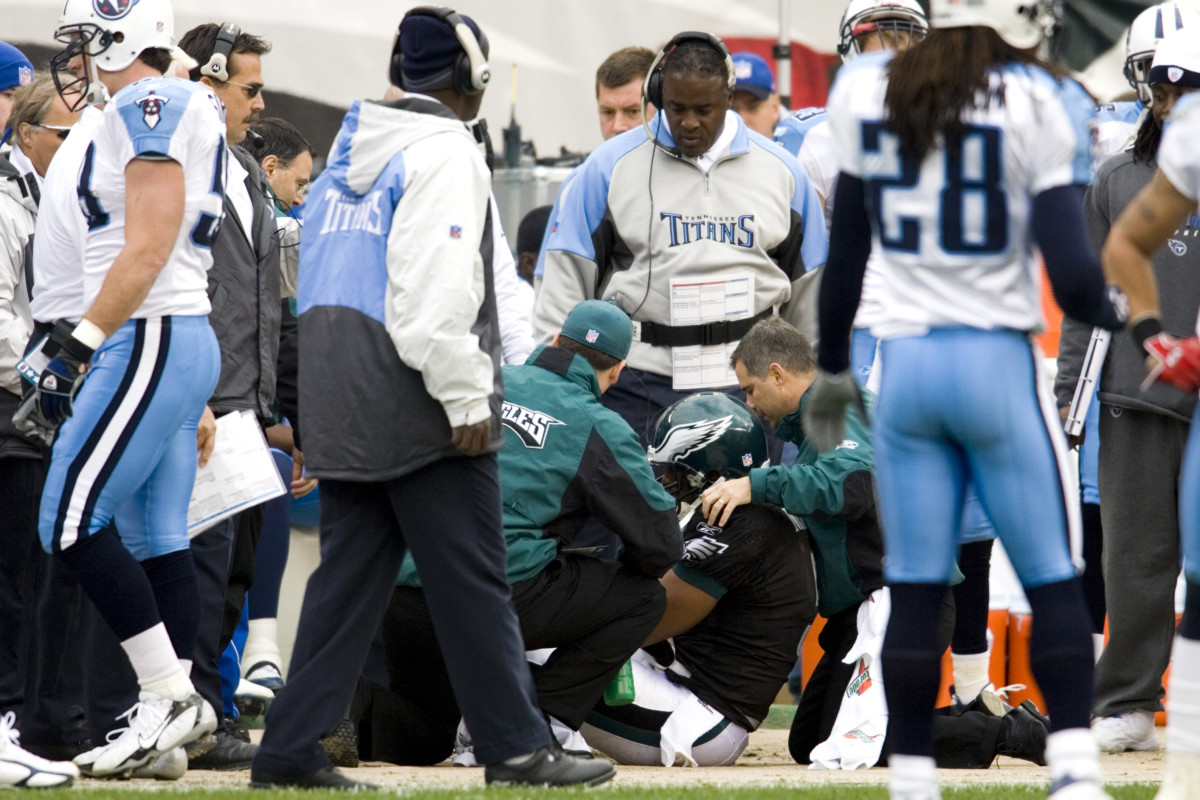Alex Smith on Mahomes’s Rookie Year QB Dinners and Osmosis
For one quarterback, 2017 marked the beginning; for the other, the beginning of an end. But tension? No. Not between Chiefs quarterback Alex Smith and the rookie his team had traded up for. Patrick Mahomes could play. Smith could help him play better, faster—if, that is, he wanted to mentor rather than stave off.
Their coach, Andy Reid, didn’t tell Smith to do anything, necessarily. But he still expected that Smith, one of the respected NFL players of the past 20 seasons, would anyway.
He did, welcoming Mahomes in all manner of ways except for asking whether the first-round draft pick wanted to move in. Smith would ping the group text chain on an off day, planning out a collective workout, lunch and film review session. On Thursdays, he’d organize the most coveted meal in Kansas City: “QB Dinner.” It was invite-only, position specifics required for entry. Some weeks they’d wear sweats, bring their kids and sample different BBQ spots—speaking from experience, everyone knows the best one is Jack Stack—while other times they’d dress up and take their wives or girlfriends out somewhere with white linen tablecloths.
“It was always just QB Dinner,” Smith says. “Said it all. It was a way to bond. And that’s when I discovered …”
The rookie quarterback who slung passes sidearm, who ran all over and then launched passes halfway down the field, well, he was remarkably consistent in his eating/drinking/condiment habits. “An affinity for Coors Light, ketchup and Cool Ranch Doritos,” Smith says. He laughs, then adds, “long before any endorsement opportunities.”
After dinner, the quarterbacks would head back to team headquarters for a late film review session. Those nights always ended the same way. They’d head down to the locker room for a game of H-O-R-S-E. But they called it C-H-I-E-F-S instead. Smith notes that he didn’t have as much on-court experience as Mahomes and Tyler Bray, both of whom played hoops in high school. Smith refashioned his goals, trying all sorts of elaborate trick shots, aiming “not to finish last.”

When Smith looks back at that time he sees osmosis, on his end and on Mahomes’s end. The rookie saw how Smith prepared, saw Smith around his wife and children and saw Smith lead. Now 27, it’s Mahomes who does those things, and his coaches believe he does them well in part because of Smith’s influence. “The real beauty of that entire situation was just the osmosis,” Smith says. “Like, Let’s get him here. Let him be around. Let him see how this works.”
In doing what came naturally, though, Smith also reinforced how the football franchise in Kansas City operated. He saw the approach as developmental. He believes that started—still starts—with Reid, his methods subtle and impactful at the same time. “I didn’t have a great grasp on it then,” Smith says. “But that’s just the beauty of what Andy put together.”
That was only six seasons ago. But their time together, in the friendliest of incubators, can sometimes feel like another lifetime. Mahomes was just an unproven rookie, über-talented, but far from the sure bet he quickly became. He’ll win his second league MVP award next week. Back then, Reid was still known for the Super Bowls he hadn’t won. On Sunday, he will coach in his third championship game in the last four seasons. Together, they’ve hosted five straight AFC championship games, an NFL first.
Smith sees his old coach and mentee as right on the fringe of becoming a bona fide dynasty. Win again, he says, “and they become one of those teams that just really leaves a mark. That’s what’s sitting in front of them.”
Much like the atmosphere he fostered, Reid knew football, and he knew scheme. But Smith says his greatest strength is a teacher, a head coach who oversees every person on the practice field, who Smith describes as someone with “such a great fundamental understanding, a simple way to communicate his teaching points.”
Smith always appreciated Reid’s honesty, both when the coach traded for him and when Reid traded him away. He understood. Mahomes was elite, a future star in the capable, meaty hands of a Hall of Fame coach. “[Reid] is up there,” Smith says. “He’s up there with Bill Walsh, the Landrys, guys like that. If he wins this next one, he puts himself on a whole different level. If he wins this, I think it’s him and [Bill] Belichick.”

THEN TO NOW:
This is Howie Roseman, the Eagles’ GM, both now and when they won Super Bowl LII. He’s discussing how he came to learn the importance of backup quarterbacks. And that lesson came from the same coach who will face Philadelphia this weekend, Andy Reid. The story is also relevant because both the Chiefs and the Eagles needed to turn to backups late in the season.
“In 2002, Donovan [McNabb] fractured his fibula. It was the first time we had—certainly, I had—really dealt with an injury. I was in the hallway the day after, and it was one of those moments that kind of affects you for the rest of your career. We had just lost Donovan and we were the No. 1 team in the NFC team at the time and we had six games left. I remember running in to Coach Reid and he goes, like he always does, ‘Roseman, how we doing this morning?’
“I was like, ‘All right, coach.’ And he looks at me and goes, ‘We are going to be fine, we are going to be just fine.’
“The next game we went to San Francisco, Koy Detmer was our starting quarterback and Koy Detmer [dislocated his elbow]—he was shaking on the field. All the sudden A.J. Feeley comes on the field, and we end up going 4–2 and we end up losing in the [conference] championship game that year.
“And then it came back and in 2003 in the championship game, Donovan didn't finish that game. In 2005, Donovan had a sports hernia, and we needed a backup quarterback. In 2006, Donovan tore his ACL, and Jeff Garcia led us to a playoff win. And so we had, then in 2010, we lost Kevin Kolb in the first game Michael Vick came in. In 2012, Mike got hurt, and Nick [Foles] came in. In 2013, Mike got hurt, and Nick had the 27-to-2 [TD-to-INT] season. In 2015, Sam [Bradford] didn't play all the games.
“It’s too important, ya know? We’ve seen seasons kind of hinge on second quarterback play, and you've seen it this year too. So you know it only becomes an issue when you need one—and then it becomes a pretty big issue.”
The lesson: Love—and prepare—your backup quarterbacks.
ON BACKGROUND:
Nobody I’ve spoken with so far seems to think that Patrick Mahomes or Jalen Hurts will be severely or even significantly more injured than any player at this point in the season. Both were hurt toward the end of the year. But it seems like an all-systems-go situation.
QUOTE WITHOUT CONTEXT:
“People will say, you can't give credit, because you know, Patrick Mahomes, he’s just incredible. He just makes everyone else better. That’s bulls---. That's just flat out bulls---.”
CONTEXT:
This is Louis Riddick, the longtime NFL personnel executive and current television analyst who worked with GM Brett Veach and Andy Reid in Philadelphia. Here, Riddick is describing a notion that should be far more obvious. Veach deserves a ton of credit for the Chiefs’ success. In fact, he pounded tables for Mahomes so hard that they broke in pieces. The whole idea that one quarterback is responsible for their team’s success is silly. Even one as good as him.
ELSEWHERE ON THE MMQB
• Conor Orr on the Lane Johnson false start controversy
• Albert Breer on how Sean Payton won’t let Russell Wilson control his fate
• Alex Prewitt on Colin Kaepernick’s project checking autopsies
